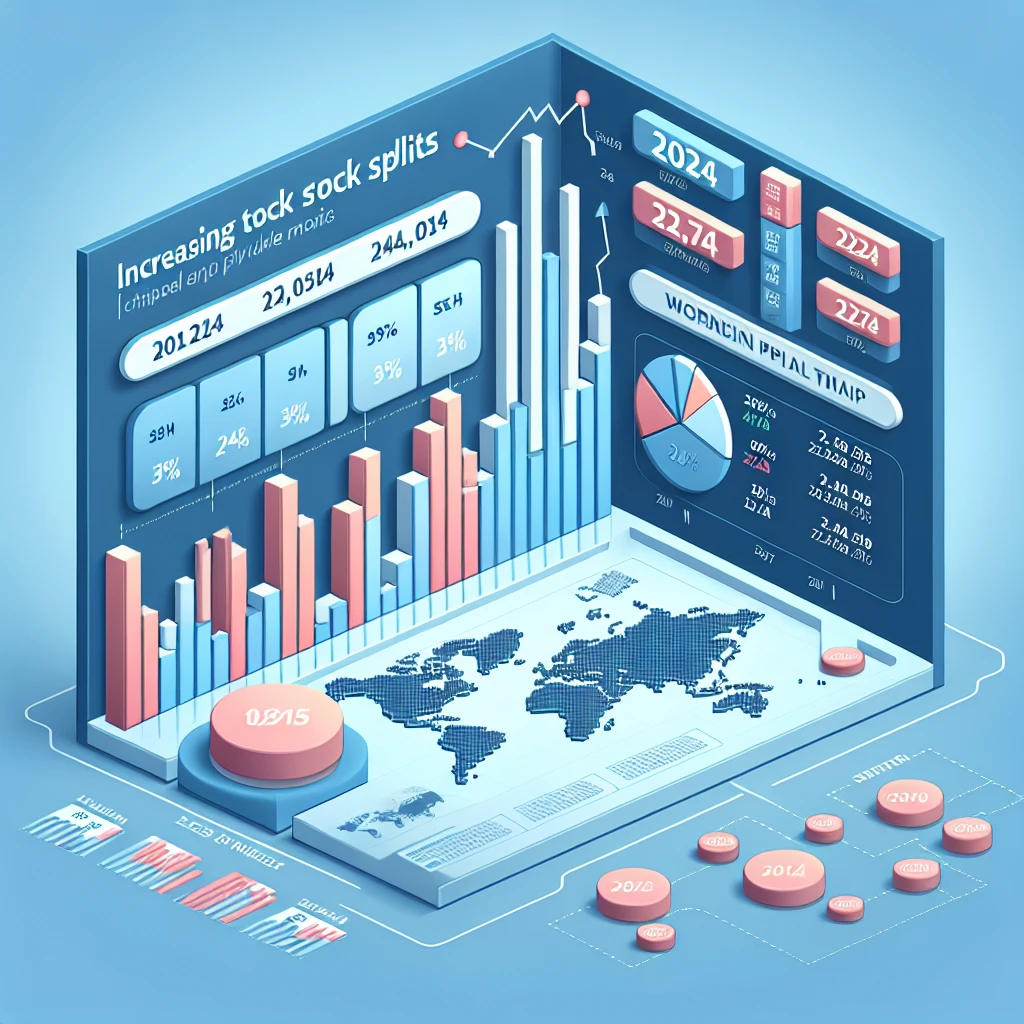While artificial intelligence (AI) has dominated conversations on Wall Street over the past two years, the excitement surrounding stock splits has played an equally pivotal role in driving the stock market in 2024.
A stock split is a strategic maneuver available to publicly traded companies, allowing them to adjust their share price and the number of outstanding shares proportionally. This adjustment is purely aesthetic as it does not affect the company’s market capitalization or its fundamental operating performance.
There are two main types of stock splits, and investors tend to favor one significantly more than the other. Reverse stock splits aim to boost a company’s share price, often to maintain its listing on a major stock exchange. On the other hand, forward stock splits decrease a company’s share price, typically to make shares more accessible to retail investors and employees.

While reverse stock splits often signal operational challenges, companies opting for forward splits are usually outperforming their rivals and are at the forefront of innovation in their industries. In essence, investors often gravitate towards companies executing forward-stock splits.
As 2024 kicked off, 13 notable companies either announced or completed a stock split, with 12 engaging in forward splits. Among these, AI giants Nvidia (-4.08%) and Broadcom (-10.36%) stand out, but this week, the spotlight shifts to two new entrants in Wall Street’s stock-split roster.
Nvidia and Broadcom were among Wall Street’s most eagerly awaited stock splits.
The buzz around AI is palpable, and since 2023 began, Nvidia’s shares have soared by an astounding 639% as of the closing bell on September 3, while Broadcom experienced an impressive 173% increase. These substantial gains prompted Nvidia to execute a 10-for-1 forward split in early June, followed by Broadcom’s first-ever 10-for-1 split in mid-July.
Nvidia’s remarkable ascent, briefly making it the largest publicly traded company, is largely attributed to its high-performance graphics processing units (GPUs). The company’s H100 GPU is the go-to choice for AI-accelerated data centers.
Moreover, the demand for the H100 and its successor, the Blackwell platform, set to debut in early 2025, has outpaced supply. When demand significantly exceeds supply, prices typically rise. The H100 GPU commands a price 100% to 200% higher than Advanced Micro Devices’ MI300X AI-GPU, leading to a marked increase in Nvidia’s gross margin since the start of 2023.
Meanwhile, Broadcom has emerged as the preferred provider of AI networking solutions. Introduced in the second quarter of 2023, the Jericho3-AI fabric can connect up to 32,000 GPUs in high-compute data centers. Broadcom aims to minimize tail latency and help businesses maximize their GPUs’ computing capacity.
Broadcom, however, boasts a more diverse revenue stream than Nvidia. It is a leading supplier of wireless chips and accessories for 5G smartphones and offers a broad range of optical components and networking solutions for industrial and automotive sectors.
While Nvidia and Broadcom have enjoyed their time in the spotlight, two new companies are set to take the stage this week.

Sirius XM Holdings
Among Wall Street’s latest stock-split players, Sirius XM Holdings (-6.19%) is the sole company of the 13 set to carry out a reverse split.
Sirius XM is in the final stages of merging with Liberty Media’s Sirius XM tracking stock, Liberty Sirius XM Group (-2.08%)(0.30%)(-2.17%), which will cease trading after the market closes on September 9. This merger aims to consolidate Sirius XM into a unified class of common stock.
Upon completing the merger, Sirius XM will execute a 1-for-10 reverse-stock split after trading hours on September 9.
Although reverse splits are often linked to operational difficulties, Sirius XM is not at risk of delisting. The company has around 3.85 billion outstanding shares, keeping its share price in the mid-single digits for over a decade. Some institutional investors might see low-priced stocks as risky, so this split, boosting its share price tenfold, could attract larger investors.
Despite its slower growth, Sirius XM maintains several competitive advantages. Being the sole licensed satellite-radio operator grants it pricing power, helping it stay ahead of inflation. With Spotify Technology recently raising its subscription costs, Sirius XM is well-positioned to follow suit in the coming months.
Sirius XM’s revenue generation differs significantly from traditional radio operators. While most terrestrial and online radio providers rely heavily on advertising revenue, Sirius XM derived about 77% of its net sales from subscriptions in the first half of 2024.
Ad-driven models thrive during economic expansions but can falter during downturns. In contrast, Sirius XM’s subscribers are less likely to cancel services, providing a more stable revenue floor than its peers.
Cintas
Taking the spotlight this week alongside Sirius XM is Cintas (-2.13%), a leader in corporate uniforms and business services.
On May 2, the board approved a 4-for-1 stock split, set to occur after trading ends on September 11. This marks Cintas’s sixth stock split since its IPO in August 1983. With its shares having risen nearly 84,000% since the IPO, or 124,800% with dividends, a stock split is timely.
Though supplying corporate uniforms and business accessories like floor mats and safety kits isn’t groundbreaking, Cintas capitalizes on the non-linear economic cycle.
Since World War II, only three of 12 U.S. recessions have lasted over 12 months, with none exceeding 18 months. Conversely, most economic expansions persist for years, with two periods surpassing a decade. Prolonged growth cycles benefit companies like Cintas, closely tied to the U.S. economy’s health.
Cintas’s stock surge is also due to its diverse customer base, serving over 1 million businesses. This diversity ensures no single customer is critical enough to jeopardize the company.
Inorganic growth has been another key driver for Cintas. The company has completed several acquisitions since the early 2000s, including Zee Medical in 2015 and G&K Services in 2017. These acquisitions not only boost earnings but also expand Cintas’s product offerings and promote cross-selling opportunities.
This week, all eyes are on Sirius XM and Cintas.
Don’t miss this second chance at a potentially lucrative opportunity
Ever feel like you’ve missed out on investing in top-performing stocks? Here’s your chance to catch up.
Occasionally, our team of analysts issues a “Double Down” stock recommendation for companies poised for significant growth. If you’re concerned about having missed an opportunity, now is the ideal time to invest before it’s too late. The results speak for themselves:
Nvidia: A $1,000 investment when we doubled down in 2009 would now be worth $266,599!*
Apple: A $1,000 investment when we doubled down in 2008 would now be worth $41,774!*
Netflix: A $1,000 investment when we doubled down in 2004 would now be worth $359,044!*
Currently, we’re issuing “Double Down” alerts for three remarkable companies, and there may not be another opportunity like this soon.
See 3 “Double Down” stocks ›
*Stock Advisor returns as of 09/09/2024




